Keeping your face clean by washing daily is essential for skin health and appearance. Plus, it helps reduce acne breakouts and flareups by minimizing buildup of oil, grease or other forms of debris and residue on skin, especially after a long, warm day or sweaty workout. In general, it’s important to wash your face with a facial cleanser at night before going to bed, along with in the morning after a night’s rest to start the day with freshly cleaned skin and a soft, more dewy look.
Here’s everything to know about facial cleanser ingredients, how they works, best tips and practices, different types of facial cleansers to choose from and what to keep in mind when buying for the most effective and safe results, based on your individual skin type and needs.
What is a Facial Cleanser?
“Facial cleanser is a skincare product specifically designed to remove dirt, oil, makeup and dead skin cells from the skin, and it’s used as the first step in any skincare routine (both morning and night),” explains Dr. Marisa Garshick, MD, FAAD, board-certified dermatologist in NYC and New Jersey and clinical assistant professor of dermatology at Weill Cornell Medicine.
It helps maintain skin health and appearance by promoting a more clear complexion, preventing clogged pores or breakouts and prepping skin for the remaining products in your typical or daily skin care routine, such as face serums, creams, toners and moisturizers. Cleansing is necessary for skin health as it properly removes makeup and buildup of dirt or residue, thus keeping it clean.
What is the Best Facial Cleanser?
Here are a few beneficial ingredients to look for in a facial cleanser along with some to avoid. Hyaluronic acid is an excellent property in skincare and facial cleansers, in particular. Hydrating and smoothing, it’s ideal for all skin types and helps with locking in and retaining moisture.
“Humectants help draw water into the skin and are great for providing hydration without adding heaviness,” Gershick explains. “Ceramides are also beneficial in facial cleansers and reinforce the skin barrier to prevent moisture loss, which is ideal for dry or sensitive skin,” Gershick says.
While not everyone will need or benefit from a facial cleanser with salicylic acid, it can be a good ingredient to use daily and in a facial cleanser if your skin is rather oily or you often get pimples.
“Salicylic acid is a BHA that penetrates pores to clear out excess oil and debris, so it’s great for acne-prone or oily skin,” Gershick explains.
As for what to avoid in facial cleansers, it’s usually better to choose options free of alcohols, artificial fragrances, dyes and harsh exfoliating textures.
“While some alcohols are fatty and beneficial, denatured alcohol can be drying and sensitizing, and artificial fragrances or dyes can negatively affect skin health and appearance by triggering allergic reactions, especially in those with sensitive or eczema-prone skin,” Gershick says.
Harsh exfoliants, such as physical scrubs, can also be detrimental to skin in certain individuals as they create micro-tears in skin, especially with poor application or abrasive, rough scrubbing. Harsh exfoliants are especially problematic for aging and sensitive skin types, Gershick notes.
The Best Facial Cleanser For Your Skin Type
Here’s how to choose a facial cleanser based on skin type and need for optimal results.
Dry Skin: “Look for cream or milk cleansers with hydrating ingredients like glycerin, hyaluronic acid or ceramides, and avoid foaming or gel cleansers that can strip moisture,” Gershick says.
If you have dry skin, choose a facial cleanser with moisturizing properties. It’s a good idea to wash with lukewarm water, Gershick suggests, as well apply a moisturizer or type of hydrating topical immediately after to increase moisture and give skin a more soft, supple and dewy appearance.
Sensitive Skin Types/Skin Conditions: For sensitive skin or those with conditions including eczema, psoriasis and rosacea, it’s important to be vigilant and read labels. Facial cleansers with certain properties can backfire, causing skin irritation, redness and exacerbated symptoms. Exposure to harsh additives, overuse and excessive or rough application are some examples of triggers.
“It’s best to buy facial cleansers that are fragrance-free and have minimal-ingredient formulas with soothing agents like aloe, chamomile, or oat extract,” Gershick suggests, along with opting for facial cleansers free of fragrance, sulfates and exfoliating acids, and gently washing skin.
Aging Skin: Keeping skin health and appearance fresh, taut and youthful looking is critical with age. In a facial cleanser, green flags include creamy or milk cleansers with antioxidants as well as those with peptides or ingredients to support the skin barrier and fight oxidative stress, along with other anti-aging benefits, Gershick notes.
“Avoid stripping or overly astringent formulas that dry out the skin, which can worsen the appearance of fine lines,” Gerschick says. “When cleansing, massage gently in upward motions and use products with anti-aging benefits right after cleansing while skin is still damp,” Gershick adds, for increased absorption and skin-boosting effects.
Combination Skin: “Balancing gel cleansers that remove oil in the T-zone but don’t dry out the cheeks are ideal,” Gershick says, suggesting use of niacinamide, for it’s a great multitasker. “Double cleanse at night if you wear makeup or sunscreen to ensure your skin is clean but not stripped,” Gershick adds.
Make sure to avoid face wash with overly rich or heavy consistencies, which can clog pores. A tip? Combination skin type can be tricky to manage, but these tips and methods make it much easier.
Oily/Acne-Prone Skin: “Gel or foaming cleansers with ingredients like salicylic acid, tea tree oil or zinc help to regulate oil and prevent breakouts,” Gershick says, and suggests not using those with comedogenic ingredients or abrasive textures, which can be harsh on skin and trigger more rebound oiliness and breakouts.
Don’t over-wash either. Twice daily is enough. After cleansing, apply a lightweight moisturizer.
Best Facial Cleansers to Try at Vitacost
Acure Brightening Cleansing Gel
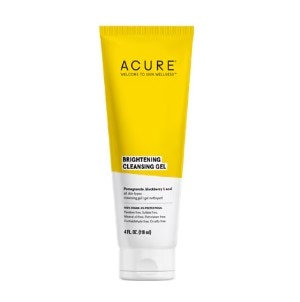 “This cleanser uses pomegranate, açai and blackberry for antioxidant support, making it great for those dealing with dullness or uneven tone,” Gershick says. It has a gel texture, which helps lift impurities without over-drying skin. It’s great for people with normal to combination skin types and in need of brightening, treating and preventing dark spots for refreshing their complexion.
“This cleanser uses pomegranate, açai and blackberry for antioxidant support, making it great for those dealing with dullness or uneven tone,” Gershick says. It has a gel texture, which helps lift impurities without over-drying skin. It’s great for people with normal to combination skin types and in need of brightening, treating and preventing dark spots for refreshing their complexion.
Andalou Naturals Age Defying Apricot Probiotic Cleansing Milk
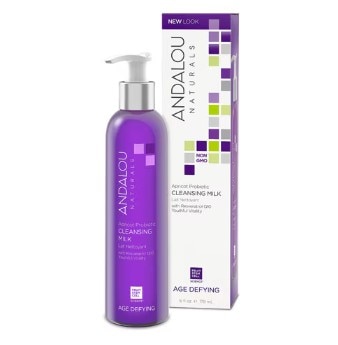 “This nourishing, milky cleanser is packed with probiotics to support the skin barrier and reduce inflammation—perfect for mature or dry skin,” Gershick says. Apricot oil is a great ingredient to include for providing gentle nourishment, making it a go-to for those experiencing signs of aging or looking to soften and hydrate skin tone and appearance.
“This nourishing, milky cleanser is packed with probiotics to support the skin barrier and reduce inflammation—perfect for mature or dry skin,” Gershick says. Apricot oil is a great ingredient to include for providing gentle nourishment, making it a go-to for those experiencing signs of aging or looking to soften and hydrate skin tone and appearance.
Cetaphil Gentle Skin Cleanser
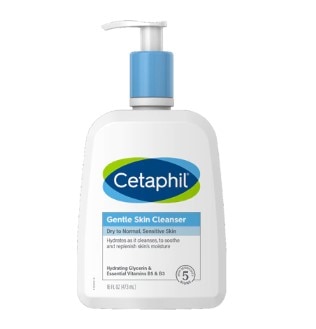 A classic for a reason, this non-foaming cleanser is ultra-gentle, making it ideal for those with sensitive skin types, as well as people with skin conditions like eczema or rosacea. “Its simple, minimal-ingredient formula cleanses without irritating or stripping essential moisture,” Gershick says.
A classic for a reason, this non-foaming cleanser is ultra-gentle, making it ideal for those with sensitive skin types, as well as people with skin conditions like eczema or rosacea. “Its simple, minimal-ingredient formula cleanses without irritating or stripping essential moisture,” Gershick says.
Derma-E Hydrating Cleanser
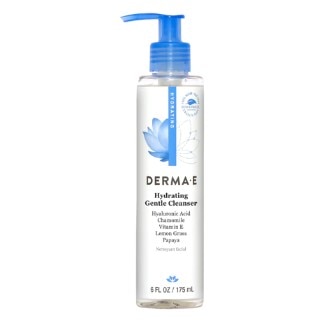 Formulated with hyaluronic acid and antioxidant-rich ingredients like vitamin C and green tea, this cleanser deeply hydrates skin and offers protection against free radical damage. “It’s a great fit for dry or mature skin, offering both cleansing and antioxidant benefits in one step,” Gershick says.
Formulated with hyaluronic acid and antioxidant-rich ingredients like vitamin C and green tea, this cleanser deeply hydrates skin and offers protection against free radical damage. “It’s a great fit for dry or mature skin, offering both cleansing and antioxidant benefits in one step,” Gershick says.
Mad Hippie Jelly Cleanser
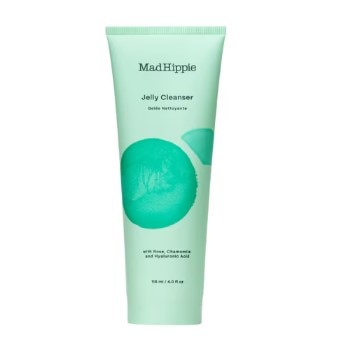 This jelly-to-milk cleanser contains sea buckthorn, known for omega fatty acids and antioxidant content, which helps nourish and calm the skin. “Its unique texture makes it an effective facial cleanser for removing makeup and impurities gently, and it is suitable for all skin types including sensitive or dehydrated skin,” Gershick notes.
This jelly-to-milk cleanser contains sea buckthorn, known for omega fatty acids and antioxidant content, which helps nourish and calm the skin. “Its unique texture makes it an effective facial cleanser for removing makeup and impurities gently, and it is suitable for all skin types including sensitive or dehydrated skin,” Gershick notes.

